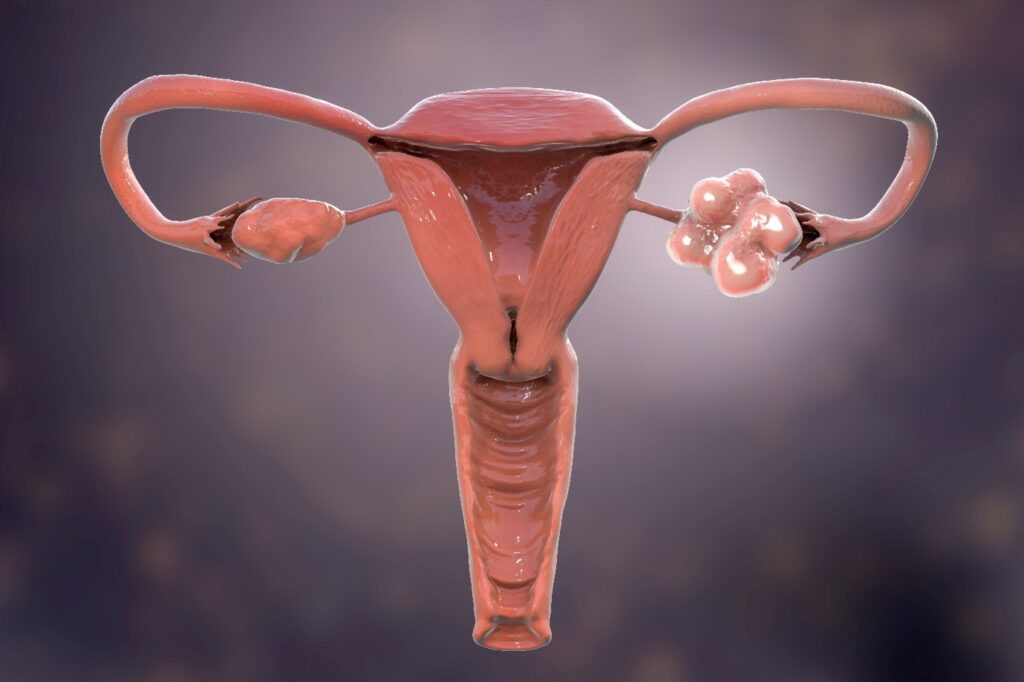Polycystic Ovary Syndrome (PCOS) is a common yet complex hormonal disorder affecting many women and people assigned female at birth (AFAB) of reproductive age.
With symptoms ranging from irregular periods to excessive hair growth, PCOS can be challenging to diagnose and manage.
However, with the right treatment plan, individuals with PCOS can lead healthy, fulfilling lives.
What is PCOS, and What Causes It?
Polycystic Ovary Syndrome (PCOS) is a condition where the ovaries produce excess hormones, particularly androgens (often referred to as “male hormones” like testosterone).
This imbalance in hormones can result in irregular or missed periods, cysts on the ovaries, and symptoms like acne, weight gain, and abnormal hair growth.
Despite the term “polycystic,” not all individuals with PCOS have cysts, and the cysts themselves are typically harmless.
The exact cause of PCOS is unknown, but several factors contribute to its development:
Androgen Excess: Elevated levels of male hormones can block the release of eggs from the ovaries, disrupting the menstrual cycle and contributing to the formation of cysts.
- Insulin Resistance: Many people with PCOS experience insulin resistance, where their bodies have difficulty processing glucose effectively. This can lead to higher insulin levels, further upsetting hormone balance.
What Are the Common Symptoms of PCOS?
PCOS presents with various symptoms that can vary from person to person.
The most common signs include:
- Irregular Periods: Many people with PCOS experience infrequent periods, which can make it difficult to conceive.
- Excess Hair Growth: This condition, known as hirsutism, involves excessive hair on the face, chest, or abdomen due to high androgen levels.
- Acne and Oily Skin: Increased androgen levels can also cause acne, particularly on the back, chest, and face, which may persist into adulthood.
- Obesity and Weight Gain: Around 40-80% of people with PCOS struggle with obesity or have difficulty maintaining a healthy weight.
- Thinning Hair: Some individuals may notice thinning or hair loss on their scalp.
- Cysts on Ovaries: Many women with PCOS have ovaries that appear larger or contain multiple small cysts when viewed through an ultrasound.
- Darkened Skin: Dark skin patches, particularly in areas like the neck, armpits, and groin, may develop due to a condition called acanthosis nigricans.
How Is PCOS Diagnosed?
Diagnosing PCOS involves a combination of medical history, physical examination, and specific tests:
- Symptom Evaluation: Your doctor will ask your symptoms, menstrual history, and family medical history.
- Blood Tests: These help to measure hormone levels (like androgens, estrogen, LH, and FSH) and assess glucose levels to check for insulin resistance.
- Ultrasound: Ultrasound may be performed to check for cysts on the ovaries and assess the health of your reproductive organs.
Typically, PCOS is diagnosed when a person has at least two of the following three symptoms:
- Irregular periods or no ovulation.
- Excess androgens (leading to acne, excess hair growth, or blood tests confirming high androgen levels).
- Cysts on the ovaries, though not everyone with PCOS has them.
How Can PCOS Be Treated or Managed?
While there’s no cure for PCOS, various treatments can help to manage symptoms and improve quality of life. Treatment depends on your symptoms, whether you wish to get pregnant, and any other underlying health conditions. Common approaches include:
- For Those Not Trying to Conceive:
- Hormonal Birth Control: Birth control pills, patches, or IUDs regulate periods, reduce acne, and control excess hair growth by balancing hormones.
- Insulin-Sensitizing Medications: Drugs that are commonly used for diabetes, can improve insulin sensitivity and regulate periods.
- Anti-Androgen Medications: Some medications that block the effects of androgens, helping reduce acne and excess hair growth.
- For Those Trying to Get Pregnant:
- Ovulation-Inducing Medications: Drugs that stimulate ovulation and increase the chances of conception.
- In Vitro Fertilization (IVF): IVF may be recommended if ovulation medications aren’t effective.
Lifestyle changes, such as regular exercise, healthy diet, and weight management, can also help regulate insulin levels and reduce PCOS symptoms.
Can PCOS Affect Fertility and Pregnancy?
PCOS is one of the leading causes of infertility due to irregular ovulation. People with PCOS may struggle to get pregnant because their ovaries don’t release eggs regularly. However, many individuals with PCOS can conceive with the help of ovulation-stimulating medications or assisted reproductive technologies like IVF.
In addition to fertility issues, PCOS may increase the risk of pregnancy complications such as:
- Gestational Diabetes: High blood sugar during pregnancy.
- Preeclampsia: High blood pressure during pregnancy.
- Preterm Birth or C-Section Delivery: Due to complications related to obesity, diabetes, or high blood pressure.
Although PCOS increases the risk of these complications, with proper treatment and management, many people with PCOS go on to have healthy pregnancies.
Managing PCOS: A Lifelong Approach
PCOS is a condition that requires lifelong management, but with the proper treatment and lifestyle changes, individuals can effectively manage symptoms, regulate hormones, and improve their overall health. Whether it’s through medication, exercise, or dietary adjustments, there are many ways to cope with PCOS.
If you’re dealing with PCOS, don’t wait to seek professional help. At Kondeti Superspeciality Hospital, our expert specialists are here to provide guidance on treatment options and help you manage PCOS effectively. Your health is our priority, and we’re committed to supporting you every step of the way.
Struggling with PCOS? Reach out to Kondeti Superspeciality Hospital today to discover personalized treatment options and take the first step toward better health with expert care.


